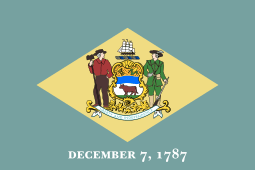United States House of Representatives election in Delaware, 1792
United States House of Representatives election in Delaware, 1792

|
|
|
|
|
|
An election to the House of Representatives for the Third Congress was held for Delaware's single seat on October 2, 1792.
Background
Delaware was represented by a single Representative, as it has for all but 10 years (1823 - 1833) of its history as a State. Delaware had been represented since the first congressional election in 1789 by John M. Vining (P), who did not run for re-election. Five candidates competed for his seat.
Election results
Contested Election
On the basis of the above returns, Patten was declared the winner. However, these returns were challenged by Latimer. At the time, Delaware's law required voters to cast votes for two candidates, at least one of whom had to be from a different county than the voter. However, the final returns included some ballots that violated this rule, while rejecting others that followed this rule. The House Committee on Elections ruled that 68 votes for Patten and 9 votes for Latimer that were accepted in the final results should've been rejected, and that 4 votes for Latimer that had been rejected should've been accepted. After these adjustments, Patten was found to have 2,205 votes while Latimer was found to have 2,238 votes. On February 14, 1794, Latimer was declared the rightful winner of Delaware's seat.[3]
See also
References
- ↑ A New Nation Votes
- 1 2 3 Party affiliation not listed in source
- ↑ A New Nation Votes